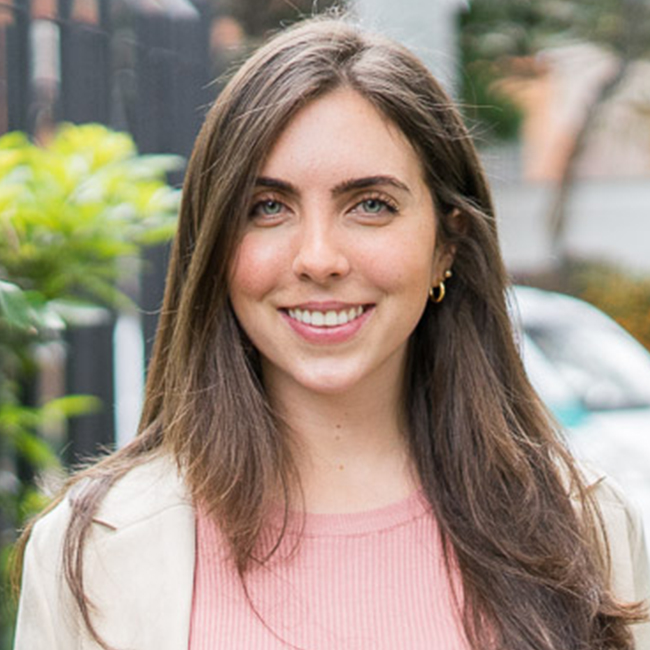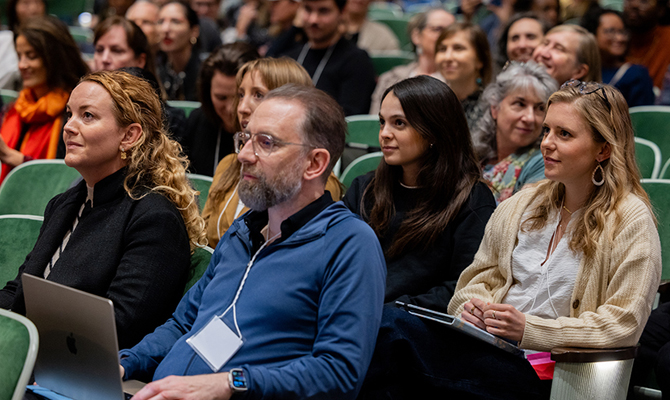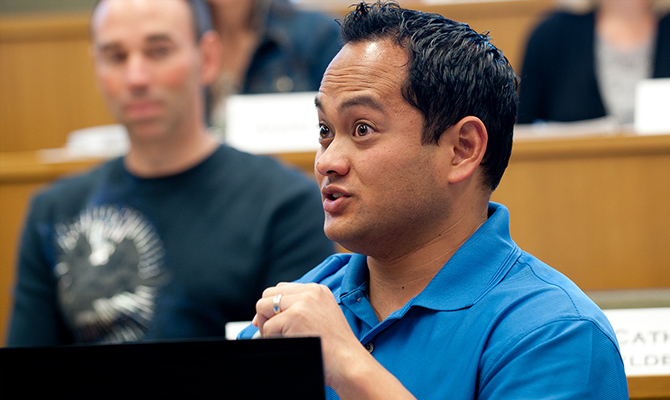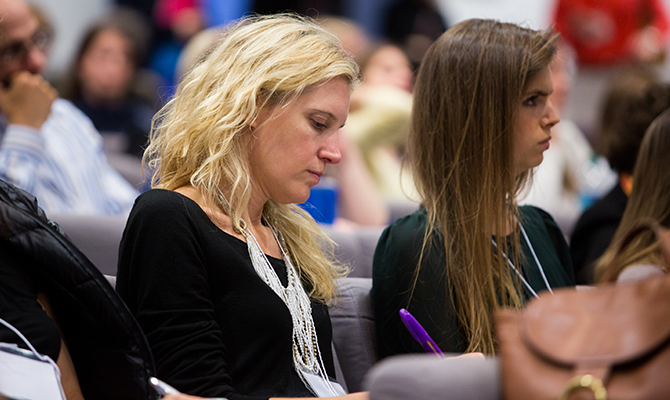
Blum Founder
Master of Applied Positive Psychology, University of Pennsylvania ‘23
Bachelor of Engineering in Industrial Engineering, Universidad Católica Andrés Bello ‘14
Amidst the economic crisis in Venezuela in the 2010s, Nicole Pérez Cueter, a student in the Master of Applied Positive Psychology program (MAPP), was early in her career at a multinational manufacturing company. While overseeing plant operators, Nicole witnessed how hardworking employees struggled to provide for their families during a time of nationwide instability. “That was one of the first experiences that ignited something in me that the purpose of a career was to do something for others,” she says.
A pivot to human resources put Nicole in a better position to raise employees’ sense of well-being. She loved helping people overcome barriers, she says, but soon her own well-being began to dwindle. “The situation in Venezuela was getting so bad. It got to a point I not only felt everyone around me was struggling, but I also was struggling.” Nicole made the difficult decision to leave her growing career and her home in 2017 for a high-risk opportunity in another country, vowing to find a way to make a positive difference in Venezuela someday.
Eager for a social impact role within Latin America, Nicole accepted a position in Bogotá, Colombia, with Polymath Ventures, a startup studio focused on empowering the lower and middle class in Latin America. The new role would lead her to discover positive psychology and Penn’s MAPP program.
At Polymath, she worked on talent strategy. “I was dedicated to finding the right type of entrepreneurs to support who were aligned with the mission of building something meaningful for Latin America,” she says. “I had questions around the differences in the qualities of founders that succeed versus founders that were not succeeding.” She recognized that her successful clients had something beyond talent, intellect, or education. “I started to think it must be something around mindset, something we can't see.”
She took her questions to mentors and co-workers. “A peer told me, ‘You know, I think the question you're trying to ask is in alignment with the science of optimal performance and positive psychology.’” They pointed her to the MAPP program and Nicole began doing her research.
“I started by reading anything related to positive psychology to broaden my mind,” she says. One of her first reads was Grit, by Penn psychology professor and MAPP visiting faculty member Dr. Angela Duckworth. “I began to think ‘How can you measure grit in entrepreneurs? How can you foster grit?’” An idea for a startup venture of her own started to form—a digital platform to help entrepreneurial talent flourish. “I wanted to build something that truly aligns with bringing positive psychology to Latin America. And I wanted to find something I could apply to what I was trying to do.”
Nicole hoped to join the MAPP program in 2020, but was unable to attend when funding opportunities fell through. Undeterred, she continued to develop the vision and goals for her startup over the next two years. “Then I tried again, and applied to all the scholarships I could,” she recalls, including the MAPP Christopher Peterson Memorial Fellowship. “I remember during those two years I was very intentional about how I could make more of an impact and add more value to the Latin American community in order to feel that I deserved the fellowship. It was clear that there were many types of people applying to it who were making great things,” she says.
When she was awarded the fellowship for the 2022-23 academic year, MAPP program director Dr. James Pawelski called her personally to inform her. “It was one of the best moments in my life,” she says.
While Nicole met her cohort and instructors in online class sessions, her first time on Penn’s campus was during the annual MAPP Summit, an experience she describes as “overwhelmingly beautiful.” As a fellowship recipient, Nicole was on the schedule to give a speech. She remembers walking into a room of faculty, staff, and alumni she didn’t know: “Every face was extremely welcoming,” she says. “It was really impressive to be surrounded by so many brilliant people that were also humble and that made you feel you belong there.” During her speech, she admits she was overwhelmed with emotion. “I cried a lot,” she says, “and I remember that after, almost everyone hugged me or gave me some words of encouragement. The atmosphere was so supportive.”
The network of support at MAPP, she would find, was matched by the quality of the one-year program’s curriculum.
“MAPP gave me a mental structure for all the positive psychology topics that I thought I knew about. When you hear them for the first time, they sound very intuitive. But when you are a student in this program, you realize the complexity, the nuance, the science behind each of these topics,” she says.
MAPP students take a deep dive into concepts like the PERMA theory, which describes building blocks for well-being and flourishing. Then students learn to apply those concepts. “The program really stands out for the application side,” Nicole says. “For me, that was transformational. Now I have a framework and vocabulary that I can use in my career, not only for me to understand, but to extend to others.”
During the program, Nicole founded Blum, and chose it as the focus of her culminating capstone project. “Blum is a professional growth platform that applies positive psychology principles and is designed for LATAM talent,” she says. Her research shows that even though there is ample raw talent in the region, high-quality training around emotional intelligence, communication, and leadership is out of reach. “If you want to develop yourself as a leader, normally you need coaches, but the good ones are very expensive in Latin America,” she says. “I want to create a platform-based coaching model that any manager can implement as a way to democratize access.” The initial target audience is Latin American startup talent. “I think startups are the vehicle to transform society,” Nicole explains.
Long-term, she envisions positive psychology influencing a shift in the region, which will help her keep her promise to make a positive difference back home. She credits MAPP for providing clarity to her big vision. “If you have the intention to create a great societal impact but you’re not sure how to do it,” she advises, “this program can give you the tools and structure that you need in bite-sized, digestible pieces, so you can move forward.”






